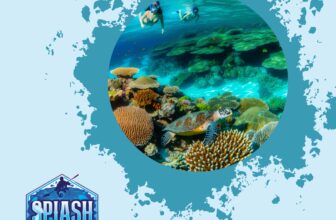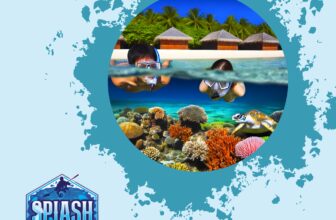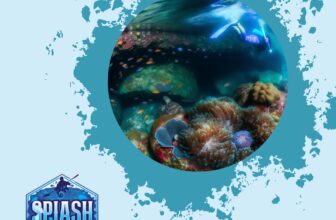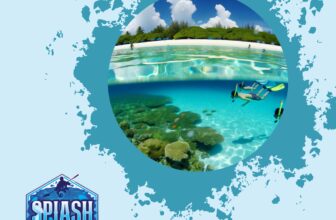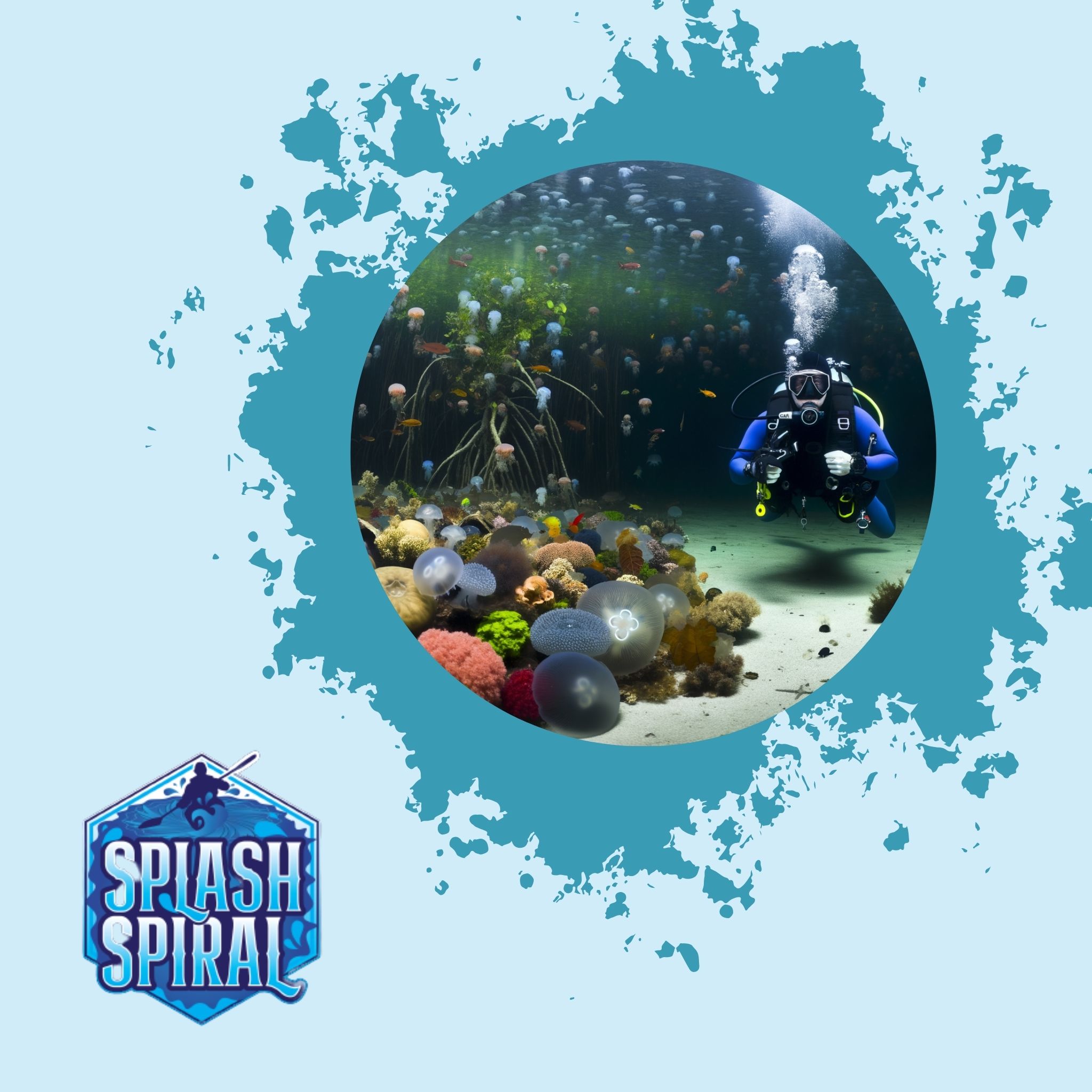
Diving isn't just about exploring coral reefs and shipwrecks. One of the lesser-known but equally fascinating experiences is diving in marine lakes. These unique ecosystems are scattered across the globe and offer unparalleled insights into marine biodiversity and conservation efforts.
Whether you're a seasoned diver or just beginning your underwater journeys, understanding marine lake ecosystems can enhance your diving experience deeply—while also raising awareness about the challenges these fragile environments face.
Introduction
So, what's a marine lake? Imagine an isolated body of seawater surrounded by land, with its own unique ecosystem. These lakes are rare but fascinating, and diving in them isn't just about the thrill. It's a chance to peek into a world that few get to see—an ecosystem that has evolved in isolation, often leading to unique species that aren't found anywhere else.
Diving in marine lakes is more than just an underwater adventure. It's educational, too. As a beginner or someone considering diving, you'll find that these lakes offer a different kind of underwater landscape compared to open seas and coral reefs. You get to observe marine life that has adapted to enclosed environments and learn about the ecological and conservation issues they face. It’s a great blend of adventure and learning, all wrapped up in one dive.
What are Marine Lakes?
Marine lakes are bodies of seawater that are almost completely isolated from the ocean, found within coastal landmasses. These unique environments differ from other aquatic ecosystems like freshwater lakes and typical coastal lagoons in their salinity, species composition, and ecological dynamics. Essentially, marine lakes are kind of like natural aquariums that provide a distinct underwater setting thanks to their unique formation and isolation.
Marine lakes are usually formed when sea levels rise, flooding coastal areas that then become isolated from the main body of the ocean due to geological and environmental factors. Over time, these lakes become separated by barriers such as reefs, sandbars, or land masses. This isolation results in distinctive ecological niches, where evolution can take unusual paths, sometimes leading to species found nowhere else on Earth.
For divers, marine lakes are an exciting frontier to explore, offering not just the thrill of diving, but the chance to witness unique forms of marine life and ecosystems that have evolved in seclusion. Understanding what marine lakes are and how they form sets the stage for appreciating the marvels they hold and the conservation efforts necessary to protect them.
Unique Ecosystems: Exploring Marine Lake Biodiversity
Marine lakes are home to an array of flora and fauna that you won't find anywhere else. These isolated bodies of seawater have evolved independently from their marine counterparts, resulting in some truly unique species. For instance, Jellyfish Lake in Palau is famous for its golden jellyfish, which have lost most of their stinging cells due to the absence of natural predators. Swimming through these jellyfish feels like floating in another world, offering a surreal experience that's hard to match.
In addition to jellyfish, some marine lakes host a variety of sponges, tunicates, and even unique species of shrimp and fish. Take Kakaban Lake in Indonesia, for example. Besides its non-stinging jellyfish, the lake boasts a rich biodiversity, including different species of mangroves, algae, and a variety of fish that have adapted to the brackish water. The unique conditions of each marine lake foster a specific set of organisms, making every dive a new adventure.
Documented observations highlight the distinctiveness of these ecosystems. Researchers and divers alike have reported seeing species engaging in behaviors and adaptations not commonly observed in regular marine environments. For instance, some fish in these lakes have developed specialized feeding mechanisms or unique coloration patterns to thrive in their enclosed habitats.
By diving into marine lakes, you’re not just observing marine life; you’re peering into isolated pockets of evolution. These experiences deepen your appreciation for marine biodiversity and emphasize the importance of preserving these fragile environments. Whether you’re encountering a jellyfish swarm or marveling at brilliantly colored sponges, each moment in a marine lake is a testament to the wonders of underwater evolution.
Diving Experience: What to Expect
Diving in a marine lake is a unique adventure that stands apart from oceanic diving. Here’s a rundown of what you can typically expect:
Visibility and Water Conditions
Marine lakes generally offer good to excellent visibility, often surpassing that of coastal waters. Because these lakes are relatively isolated from oceanic currents and sediment influx, the water tends to be stable and clear. However, visibility can vary depending on the lake's size, depth, and the presence of seasonal algae blooms.
Water conditions in marine lakes are usually calm and stable, making it ideal for beginners and those who prefer a more relaxed dive. The temperatures can range depending on the geographic location of the lake, but usually, it ranges from mildly chilly to pleasantly warm.
Marine Life Encounters
Expect to encounter a fascinating array of flora and fauna that is both unique and adapted to these specialized environments. Marine lakes often house species that are not found anywhere else on the planet, such as certain types of jellyfish that have evolved to be stingless or unique algal formations providing a surreal underwater landscape.
Notable examples include the jellyfish lakes of Palau, where divers and snorkelers can swim amidst swarms of golden jellyfish, and Indonesia’s Kakaban Island, which features stingless jellyfish as well as a variety of fish and crustaceans that are typically harder to observe in open waters.
Practical Tips for Divers
- Research Diving Permits: Some marine lakes, especially those with delicate ecosystems, may require permits to dive. Check local regulations ahead of time.
- Eco-Friendly Sunscreen: Use biodegradable sunscreens that won't harm the fragile ecosystems.
- Respect Local Guidelines: Follow all rules and guidelines set by local authorities to minimize your impact on these sensitive environments.
- Buoyancy Control: Practice excellent buoyancy control to avoid disturbing the lakebed and its inhabitants. Some marine lake ecosystems are particularly delicate and can be easily upset by clumsy movements.
Equipment Needs
While standard diving gear applies, there are a few specific recommendations for marine lake diving:
- Mask and Snorkel: For areas with shallower depths, a good mask and snorkel may be sufficient for a rewarding experience.
- Wetsuit Thickness: Adapt your wetsuit thickness to the specific temperature of the lake. A 3mm suit may suffice in warmer lakes, while a 5mm or 7mm suit might be needed for colder ones.
- Camera Gear: If you enjoy underwater photography, bring a camera suited for macro photography to capture the unique, smaller marine life.
- Dive Light: Despite the generally good visibility, a dive light can bring out the vibrant colors of marine life and help you see into nooks and crannies.
Exploring marine lakes offers a low-key yet deeply enriching diving experience. With calm waters, unique wildlife, and stunning settings, these natural wonders provide a serene escape and a glimpse into some of the planet's most extraordinary aquatic environments.
Conservation Efforts in Marine Lakes
Conservation is a buzzword in the diving community, but its importance can't be overstated, especially when it comes to marine lakes. These unique ecosystems are incredibly fragile and require concerted efforts to safeguard their delicate balance.
Governments, non-profits, and individual divers are all playing roles in conservation. For instance, many marine lakes are now part of protected zones, which restrict activities that could harm the environment. These protections are crucial for maintaining biodiversity and preventing exploitation.
One fascinating ongoing project is seagrass restoration. Seagrasses act as crucial habitats for marine life, and their restoration helps revitalize entire ecosystems. Divers can contribute by participating in "underwater gardening," where they plant seagrass in designated areas. You can find more about these initiatives at seagrass restoration.
Research is also key. Scientists are delving into the role of marine viruses in ecosystems to understand how these microorganisms affect marine lakes. This research can inform broader conservation strategies. Those interested in the specifics can explore ongoing studies linked here: marine viruses research.
Tourism is a double-edged sword. While it brings awareness and funds for conservation, it can also lead to increased human impact. This is where responsible diving practices come into play. Simple steps, like not touching marine life and being mindful of your buoyancy, can make a significant difference. Remember, as divers, we are ambassadors of these underwater worlds.
In a nutshell, conservation isn't someone else's job—it's on all of us. Whether you're a novice or an experienced diver, your actions matter. Being informed, responsible, and supportive of conservation initiatives ensures that these magical marine lakes will be around for future generations of divers to enjoy.
Environmental Impact: Challenges and Threats
Marine lakes might seem like pristine, isolated paradises, but they’re not immune to environmental challenges. Understanding these challenges is crucial for any diver keen on preserving these unique ecosystems.
First up, climate change. Rising temperatures can alter the delicate balance of these lakes by affecting both water temperature and chemistry. This shift can be harmful to the specialized species that call these lakes home, leading to reduced biodiversity or, in severe cases, local extinctions. Furthermore, ocean acidification, a direct consequence of increased atmospheric CO2, can disrupt the calcium carbonate structures that many marine organisms rely on for growth, affecting the entire food web in these ecosystems.
Pollution is another significant threat. Despite their seeming isolation, marine lakes can be affected by pollutants from nearby terrestrial sources or human activity. Runoff carrying pesticides, heavy metals, and other contaminants can find its way into these lakes, compromising water quality and health of the species residing there. In a similar vein, microplastics have been discovered in virtually every marine environment on Earth, and marine lakes are no exception. These tiny plastic particles can be ingested by marine life, causing physical harm and potentially entering the food chain.
Human activities, including tourism, present both an opportunity and a threat to marine lakes. While responsible tourism can bolster conservation efforts by providing funding and raising awareness, reckless behavior by visitors can have detrimental impacts. Physical damage from careless diving practices, such as touching or breaking underwater structures, can harm sensitive habitats. Anchoring boats improperly can also destroy areas of marine vegetation and disturb animal life.
For a deeper dive into some related issues, understanding the role of marine viruses in ocean ecosystems can broaden your perspective. Viruses, while often vilified, play a crucial role in maintaining ecological balance by regulating populations and facilitating nutrient recycling. You can read more about this in the role of marine viruses in ecosystems.
Navigating these conservation challenges requires a hands-on approach from both scientists and the diving community. As a diver, recognizing these threats and advocating for sustainable practices is part of the journey. Every dive becomes more than just an adventure; it’s a step toward preserving the captivating, little-explored ecosystems of marine lakes.
Sustainable Diving Practices
Diving in marine lakes is an extraordinary experience, but it also comes with a responsibility to protect these delicate ecosystems. Here are some actionable tips to minimize your environmental impact and promote conservation efforts while enjoying your dive:
-
Educate Yourself: Before you even set foot in a marine lake, take time to learn about its specific ecosystem and conservation status. Understanding the local flora and fauna will help you make more informed decisions during your dive.
-
Use Eco-Friendly Gear: Opt for diving equipment made from sustainable materials. Avoid using single-use plastic items and choose reef-safe sunscreen to prevent chemical contaminants from entering the water.
-
Control Buoyancy: Mastering buoyancy control is crucial. Avoid physical contact with the lake bed, plants, and marine life. Disturbing sediment can cloud the water and damage delicate ecosystems.
-
Follow Local Guidelines: Adhere to any specific rules and regulations laid out for diving in marine lakes. These guidelines are designed to protect both the environment and the divers.
-
Trash Handling: Never leave any trash behind. Even small items can have a devastating impact on marine life. Make it a habit to pick up any debris you find during your dive and encourage others to do the same.
-
Respect Marine Life: Maintain a safe distance from all marine creatures. Avoid feeding or touching them, as this can alter their natural behaviors and harm them.
-
Dive in Small Groups: Large groups can cause more disruption. If possible, dive in smaller groups to minimize your collective impact on the environment.
-
Participate in Conservation: Get involved in local conservation efforts. Many marine lakes have ongoing projects that welcome volunteer divers. This is a great way to give back while gaining a deeper understanding of these unique ecosystems.
By following these sustainable diving practices, you can help ensure that marine lakes remain vibrant and healthy for future generations of divers. For broader guidelines on responsible scuba diving, refer to resources like Splash Spiral.
Notable Marine Lakes to Explore
Jellyfish Lake, Palau
Location: Eil Malk Island, Palau
Access: Boat ride from Koror, the capital of Palau
Special Features: Famed for its millions of non-stinging jellyfish, making it a unique diving and snorkeling destination.
Diving Operators: Sam’s Tours Palau offers guided snorkeling tours with sustainable practices.
Notes: Diving is often restricted to protect the fragile ecosystem, but snorkeling provides a fantastic experience.
Kakaban Island Lake, Indonesia
Location: Derawan Islands, East Kalimantan, Indonesia
Access: Speedboat from Berau or Tarakan
Special Features: Home to four species of non-stinging jellyfish and unique brackish water flora and fauna.
Diving Operators: Derawan Dive Resort organizes tailored excursions to Kakaban Lake.
Notes: Be prepared for a short hike to reach the lake, but the view and biodiversity make it well worth the effort.
Pulau Hoga Marine Lake, Indonesia
Location: Wakatobi Marine National Park, Southeast Sulawesi, Indonesia
Access: Boat ride from Wanci
Special Features: Known for its high density of coral species and diverse marine life.
Diving Operators: Wakatobi Dive Resort offers expeditions focusing on both marine lake and reef diving.
Notes: Ideal for divers seeking both lake and reef experiences within close proximity.
Ongeim’l Tketau Jellyfish Lake, Micronesia
Location: Koror, Palau
Access: Short boat ride from Koror
Special Features: Offers a mesmerizing swim with millions of golden jellyfish.
Diving Operators: Fish 'n Fins provide eco-friendly snorkeling and educational tours.
Notes: Regulations often limit diving to reduce human impact; however, snorkeling still offers an unforgettable adventure.
Lobo Marine Lake, Solomon Islands
Location: New Georgia Islands, Solomon Islands
Access: Boat transfer from Honiara or Gizo
Special Features: Features unique marine algae and ecosystems not found elsewhere.
Diving Operators: Solomon Islands Dive Expeditions offers environmentally conscious diving tours to Lobo Lake.
Notes: Given its remote location, combining trips to nearby open-water dive sites enhances the overall experience.
These notable marine lakes not only offer extraordinary diving encounters but also underscore the importance of eco-conscious tourism. Choose certified operators who adhere to sustainable practices to ensure these fragile ecosystems continue to thrive for future generations.
How To Get Involved
For those looking to dive deeper—literally and figuratively—into the world of marine lake conservation, there are several ways to make a difference. Whether you're a newbie or a seasoned pro, your contributions can have a meaningful impact on these fragile ecosystems.
Volunteer Opportunities
One of the most direct ways to get involved is through volunteer programs. Many marine lakes located in regions like Palau offer opportunities for divers to participate in ecological surveys and habitat restoration projects. These hands-on experiences not only provide invaluable data for researchers but also offer you a firsthand look at the complexities of marine ecosystems.
Educational Programs
Knowledge is power. Consider enrolling in educational courses aimed at marine ecology and conservation. Organizations such as Project AWARE and local dive shops frequently offer specialized courses. These programs help build a strong foundation in marine biology, conservation techniques, and the specific challenges facing marine lakes. Taking these courses can greatly enrich your diving experience and empower you to become an ambassador for the environment.
Philanthropic Efforts
If you prefer to contribute financially, numerous organizations are dedicated to the preservation and restoration of marine lakes. Donations help fund vital research, habitat restoration, and community outreach programs. Some organizations even offer "adopt-a-species" programs, where your donation directly supports the conservation of a specific marine creature or plant found in these unique lakes.
Citizen Science Projects
Get involved in citizen science initiatives. Platforms like Dive Against Debris or the ReefCheck program allow divers to collect important data during their dives. This can involve monitoring marine life, recording water conditions, or reporting pollution. The aggregated data from divers worldwide provides scientists with a more comprehensive understanding of marine lake health and trends.
Ecotourism and Sustainable Travel
Finally, consider supporting eco-friendly dive operators and resorts that prioritize sustainability. These businesses often work closely with local communities and conservation organizations, ensuring that your travel impacts the environment as minimally as possible. Plus, they usually offer guided tours that educate you on best practices for responsible diving.
By taking any or all of these steps, you can play a vital role in protecting marine lakes and ensuring they continue to be vibrant havens of biodiversity. Your efforts, big or small, help safeguard these unique ecosystems, making every dive not just an adventure, but a contribution to a larger cause.
Conclusion
Diving in marine lakes is more than just an adventurous dip into clear waters; it's a chance to witness unique ecosystems that are somewhat isolated from the broader marine environment. The experience offers an intimate look at distinct flora and fauna that thrive in these secluded pockets, providing divers with both visual splendor and valuable ecological insights.
The Unique Experience
- Witness unique ecosystems
- Observe distinct flora and fauna
- Gain valuable ecological insights
Responsibilities of Divers
However, the beauty and novelty of marine lakes come with a responsibility. These fragile environments face significant threats, from climate change to pollution and human encroachment. Conservation isn't a passive endeavor; it's an active pursuit that requires the involvement of everyone who chooses to explore these underwater worlds.
Sustainable Diving Practices
As you pack your gear and prepare for your next diving adventure, remember the role you play in safeguarding these precious ecosystems.
- Adhering to sustainable diving practices
- Supporting conservation initiatives
- Educating others about the importance of preserving marine lakes
Call to Action
So, whether you're just starting your diving journey or you're a seasoned enthusiast, consider making marine lakes a part of your exploration. Not only will you unlock new facets of marine biodiversity, but you'll also contribute to efforts that ensure these unique environments continue to thrive for generations to come.
Dive responsibly, dive sustainably, and let every plunge into a marine lake be a step towards their conservation.



